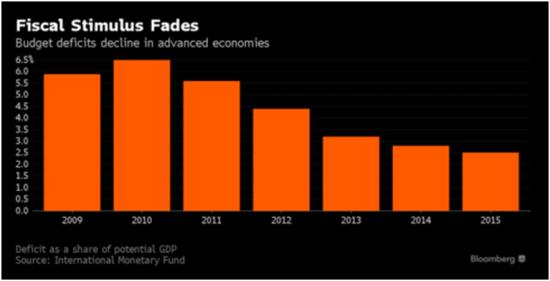A passel of investors, academics and even central bankers are calling on governments to spend more and tax less to provide a budgetary boost to the struggling global economy. That’s a 180 degree turn from the bond vigilantes of yore who pressed for smaller deficits and less debt about a quarter century ago.
To hear the budget backers tell it, bigger shortfalls are a no-brainer. With interest rates at — or even below — zero in much of the industrial world, central bankers are pushing up against the limits of what they can do to buttress growth. Yet those same low interest rates make it exceedingly cheap for governments to borrow money to finance bigger budget shortfalls.
“A large part of what monetary policy can do, it has done,” former Treasury Secretary Lawrence Summers told Bloomberg television last month. “In Japan, in Europe, and perhaps on a forthcoming basis, in the U.S., we need further impulses to growth,” including from fiscal policy.
The dirty little secret is that budgets are starting to be loosened in some countries after years of austerity. Yet in many cases, that is more by happenstance than by intent. And the size of the resulting stimulus is small and far short of the more sweeping steps advocated by card-carrying members of the budget brigade.
“There’s pretty widespread consensus in the financial community that fiscal policies should come to the rescue,” said Joachim Fels, global economic adviser for Pacific Investment Management Co., which oversees $1.43 trillion in assets.
Even central bankers are shedding their traditional reticence to stray into the political arena to sound off on the need for a more balanced growth strategy.
Lever ‘Disabled’
“It remains a pity that the fiscal lever seems to have been disabled,” Federal Reserve Vice Chairman Stanley Fischer said in a March 7 speech in Washington.
Canadian Prime Minister Justin Trudeau is leading the charge among government leaders in calling for a more active fiscal policy. “Don’t fall into the trap that thinking that balancing the books” is an end in itself, he said in a March 2 interview with Bloomberg. “It’s a means to an end.”
Budget constraints are in fact being eased by some countries. Government spending will boost U.S. growth about 0.2 percentage point this year, according to the Congressional Budget Office, thanks in part to a deal between President Barack Obama and Republican lawmakers to loosen caps on discretionary outlays. Even such a modest contribution would be the biggest since 2009.
In Germany, it’s stepped-up spending on refugees that’s turning fiscal policy more supportive of growth.
“Germany was neutral in 2015 and is now highly expansionary this year,” Ludger Schuknecht, director general of economic policy and international economy at the country’s Ministry of Finance, told a meeting of economists in Washington on March 8.
China Spending
And China unveiled plans for a record fiscal deficit this year as part of its effort to bolster its sagging economy. The Finance Ministry’s budget indicated on March 6 that the shortfall would increase to 3 percent of GDP from 2.3 percent.
Yet such steps fall short of the efforts advocated by the likes of Summers, who has repeatedly warned that the world economy faces a persistent deficiency of demand that policy makers need to address.
Angel Ubide, a managing director in Washington at Goldman Sachs & Co., complained that government officials are stuck with a long-standing “mindset” that fiscal policy shouldn’t be used to manage the ups and downs of the economy — except, according to Fischer, “in extremis, as in 2009.”
“We should not put fiscal policy in a corner and say we cannot use it,” Ubide said. “With interest rates as low as they are, there are surely public investment opportunities that generate positive returns.”
Mohammed El-Erian, chief economic adviser at Allianz SE, said he’s worried that it would take a downturn in the global economy to prompt concerted action on the fiscal front.
“That is my fear,” said El-Erian, who is also a Bloomberg View columnist. “How much of a crisis do we need as a wake-up call” for policy makers?, he asked rhetorically.
Source Article from http://feedproxy.google.com/~r/blacklistednews/hKxa/~3/qjvoF6fspU4/M.html
 RSS Feed
RSS Feed















 March 19th, 2016
March 19th, 2016  Awake Goy
Awake Goy 
 Posted in
Posted in 













